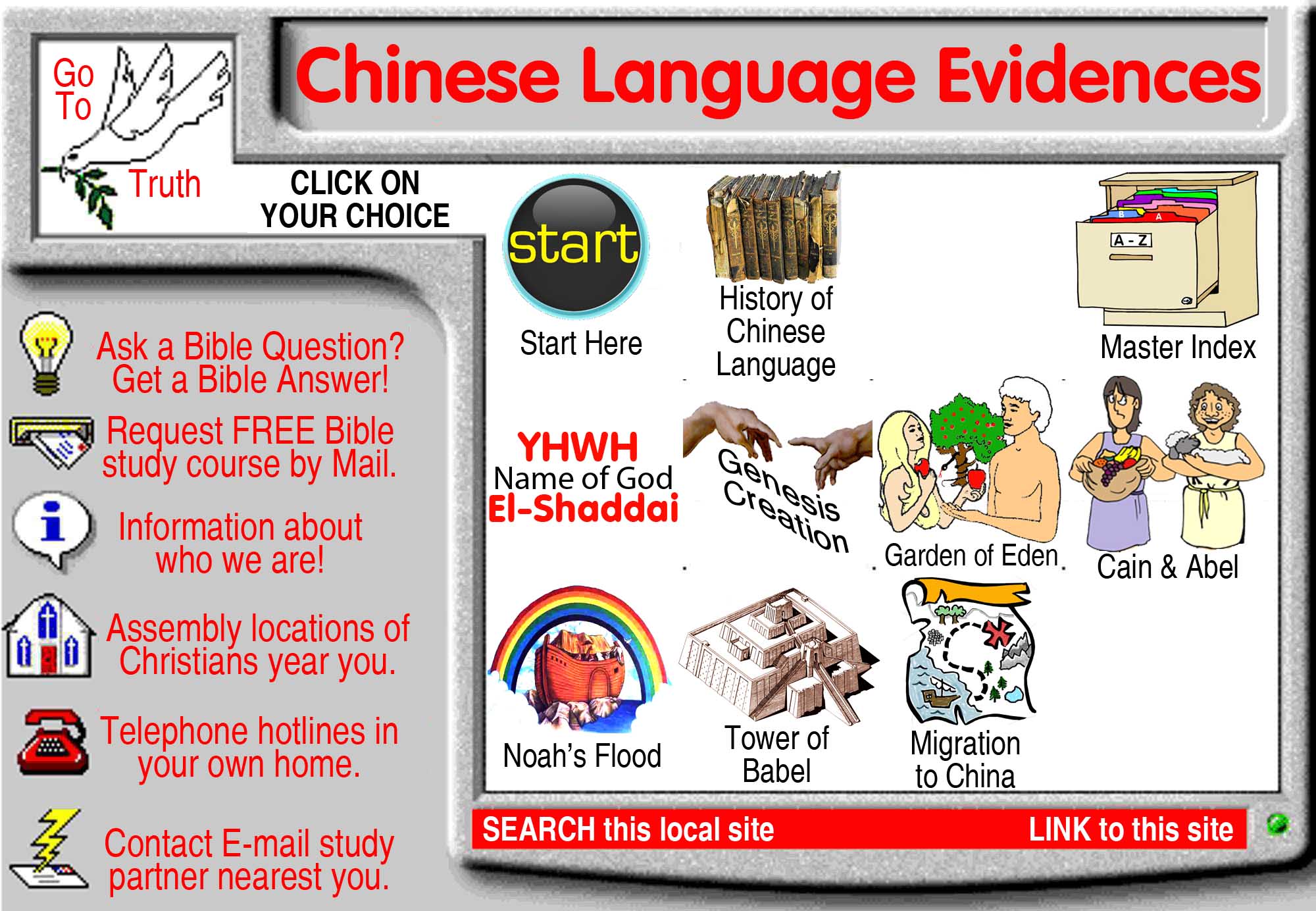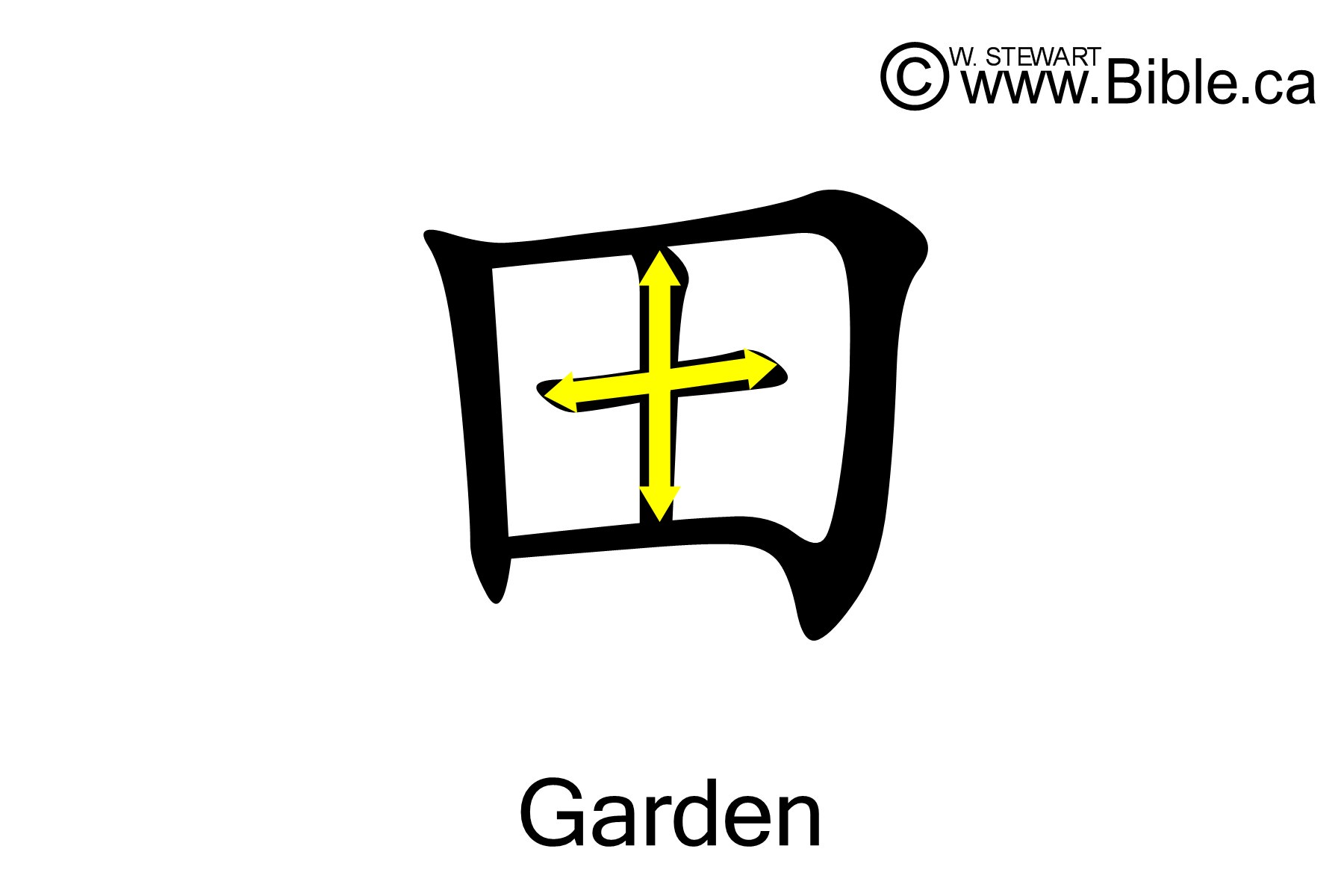
Two separate words for garden in the Chinese language represent different aspects of the GARDEN of Eden. The first is tián. In this simple image, we see the river which separated into four river heads (see the yellow arrows) spoken of by Moses (Genesis 2:10-14).
A second image for GARDEN in the Chinese is yuán. This image has amazing detail in it. Recall, Genesis 2:7 revealed that God made man of the DUST of the ground and breathed into his nostrils the BREATH of life. Genesis 2:8 tells us that God put the man whom He created into the garden ENCLOSURE. We then find that He took a rib from the man's side, and with it, He made woman (Genesis 2:21-22). All of these are found in yuán! In the lower portion, notice that the second person comes from the side of the first! , we see two people, one coming out of the side of the other! Thus, all the details about where Adam and Eve lived and how each was created is recorded in this single image for GARDEN.
In the lower portion, notice that the second person comes from the side of the first! , we see two people, one coming out of the side of the other! Thus, all the details about where Adam and Eve lived and how each was created is recorded in this single image for GARDEN.
Happiness
In this garden home provided by God, Adam was happy. He had a wife to share his time with, he had the produce of the trees for food, he had the duty of tending to the garden. But of all the things which made Adam happy, it was his relationship with God.

The ancient Chinese recorded Adam's HAPPINESS in the word fú. It depicts the close relationship he shared with his Creator, as it shows GOD and the ONE MAN in the GARDEN. Adam enjoyed fellowship with God in a way that no other man has - sin had not yet entered the world. Another word for happiness will come later in our study, but instead of showing man and God together in the garden, it will reveal the need for a sin sacrifice in order to restore man's fellowship with God.
Glory | Splendor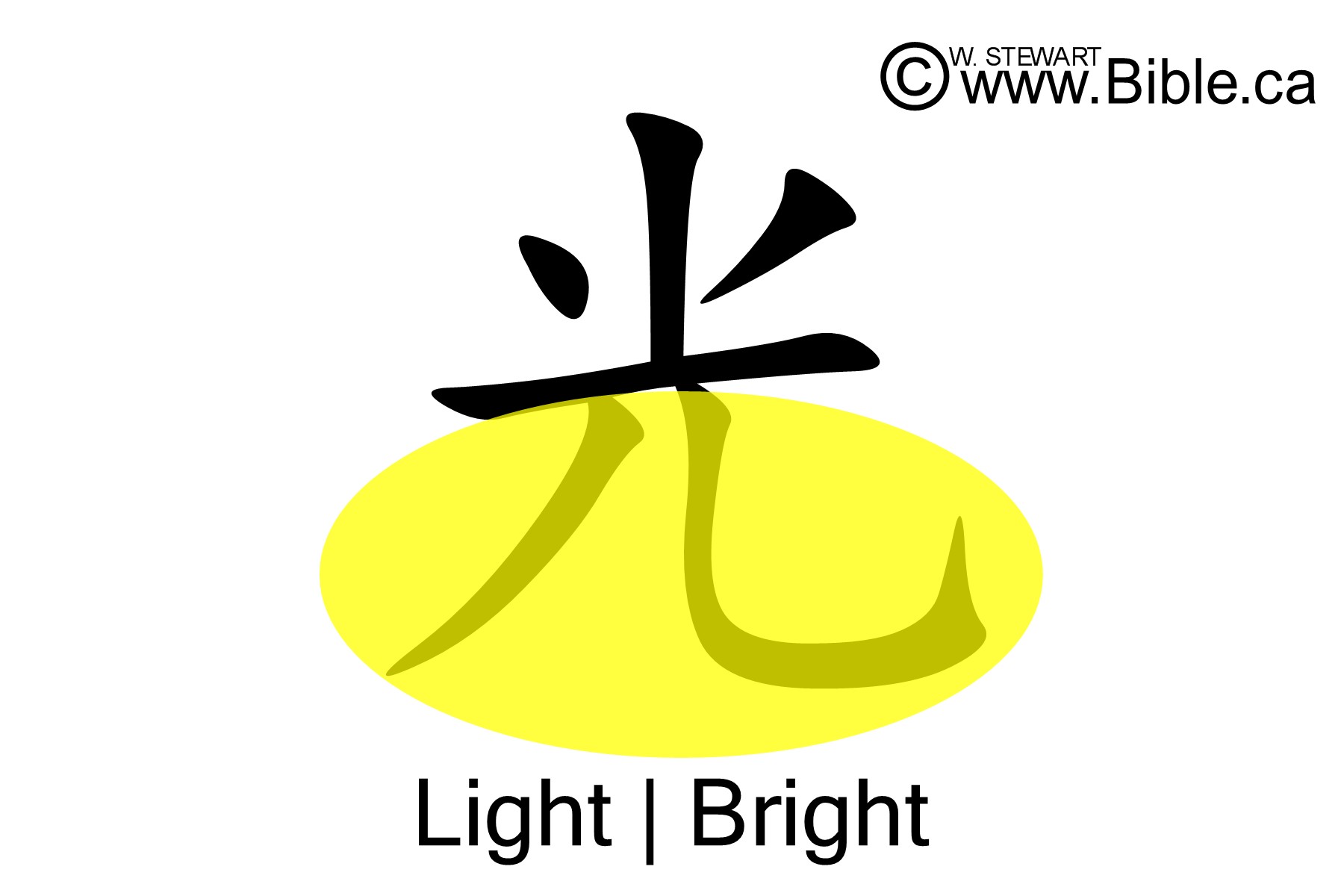
In the Creation Account article, it is noted that the word LIGHT (guang) has MAN as a base in it (see highlighted). A related word, FLAME (huo) appears in the etymology of a Chinese word meaning GLORY or SPLENDOR (róng). Notice that the base of FLAME is a man also (highlighted). Both guang (LIGHT) and huo (FLAME) reveal the radiance of Adam and Eve.  In the image for GLORY, we see two FLAMES (two radiant people - Adam & Eve) who COVER over (have an association with) a TREE. Eden had many trees in it, but there are two in particular mentioned in the Bible. The tree in this image would seem to be the tree of life, which Adam and Eve had access to. We read:
In the image for GLORY, we see two FLAMES (two radiant people - Adam & Eve) who COVER over (have an association with) a TREE. Eden had many trees in it, but there are two in particular mentioned in the Bible. The tree in this image would seem to be the tree of life, which Adam and Eve had access to. We read:
And out of the ground the LORD God made every tree that is pleasant to the sight and good for food. The tree of life was also in the midst of the garden, and the tree of the knowledge of good and evil (Genesis 2:9, NKJV)
Forbidden
The Genesis records tells us:
...the LORD God commanded the man saying, 'Of every tree of the garden you may freely eat, but of the tree of the knowledge of good and evil you shall not eat, for in the day you eat of it you shall surely die. (Genesis 2:16-17, NKJV)

Jìn is a Chinese word for FORBIDDEN. It pictures a COMMAND about the FOREST of trees which was in the garden. As mentioned above, the Bible addresses two specific trees found in the garden of Eden. The character for forest literally pictures TWO TREES. The tree of life, which was set apart from the rest of the forest was available to them, but of the tree of the knowledge of good and evil, God specifically commanded that they should not eat from it.
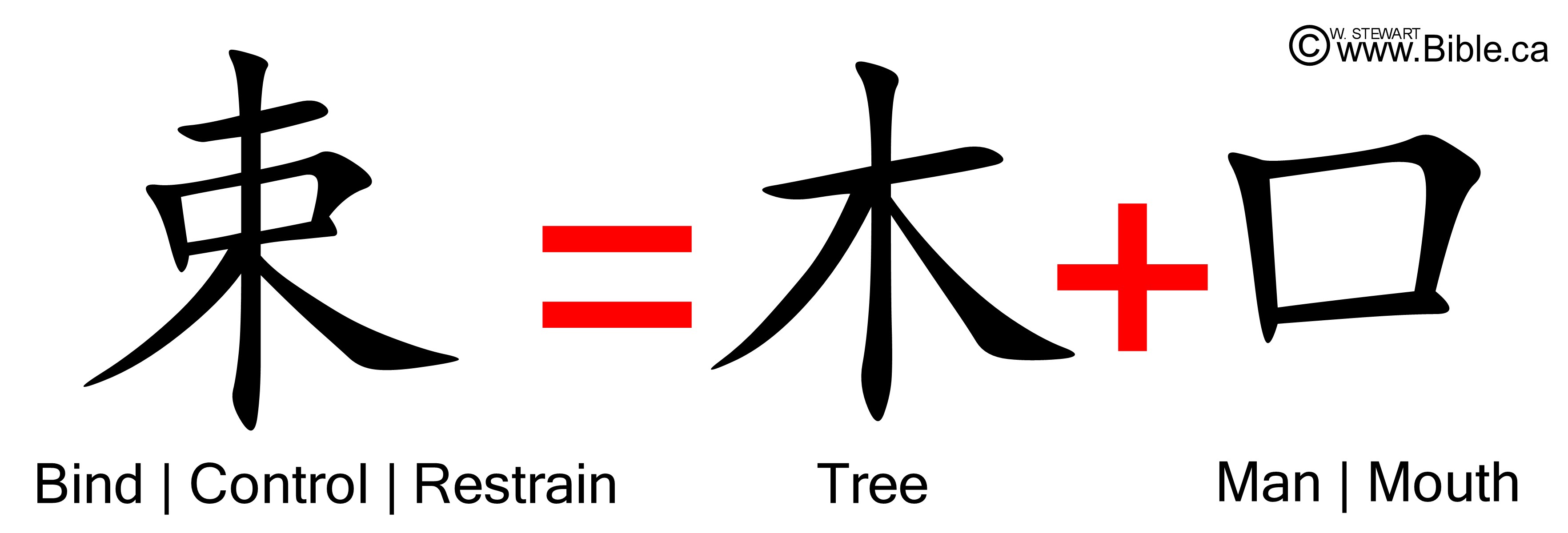
Bind | Control | Restrain
To comply with God's command, the man and his wife would need to RESTRAIN themselves from eating the fruit of the tree of the knowledge of good and evil. Shù means to BIND, CONTROL or RESTRAIN. It pictures a TREE with a MOUTH or PERSON overlaying it. They could eat from any other tree in the garden, but needed to exercise control and not take from this forbidden tree.

Execute | Put to death
God was very clear about the punishment if Adam and Eve should eat from the tree of the knowledge of good and evil. He precisely said, "..in the day you eat of it you shall surely die." (Genesis 2:17, NKJV) The word zhu means to EXECUTE or PUT TO DEATH. The etymology is very descriptive of God's warning. His WORDS warned them that if they partook of the forbidden TREE, their LIFE would return to DUST from which they were taken. After Adam and Eve had eaten the fruit of the tree which God commanded them to not eat, the Lord proclaimed:
In the sweat of your face you shall eat bread till you return to the ground, for out of it you were taken; for dust you are, and to dust you shall return. (Genesis 3:19, NKJV)

Devil & Tempter
The man and his wife were not alone in the garden. It was also home to the animals which the Lord God had made. One creature is significant in our study - the serpent. John wrote about
...the great dragon ... that serpent of old, called the Devil and Satan, who deceives the whole world... (Revelation 12:9, NKJV)

The devil began his deceptive ways in the garden, tempting Eve to take fruit from the tree of the knowledge of good and evil. The image for DEVIL in Chinese is gui. He is identified as a SECRET LIFE with MAN in the GARDEN! Take the image for DEVIL, and put it under a COVER and TWO TREES, and you get mó, which is TEMPTER! Could there be any more fit description of the tempter? This serpent of old, who would eventually deceive the whole world began his evil work of deceit by covering up the truth about the trees in the garden, thus, successfully tempting the woman to eat of the fruit of the tree of the knowledge of good and evil.

Desire | Covet
The serpent's temptation caused the woman to desire the fruit of the tree of the knowledge of good and evil. The ancient Chinese writers captured this DESIRE in the word lán. This word is a combination of the TWO TREES we've been seeing in other images and a WOMAN. It records the very thing that Moses revealed by inspiration of the Spirit:
So when the woman saw that the tree was good for food, that it was pleasant to the eyes, and a tree desirable to make one wise, she took of its fruit and ate. She also gave to her husband with her, and he ate. (Genesis 3:6, NKJV)

Beginning
In the article addressing the Creation Account, the word yuán is introduced, which pictures the BEGINNING of creation (literally, TWO PEOPLE). 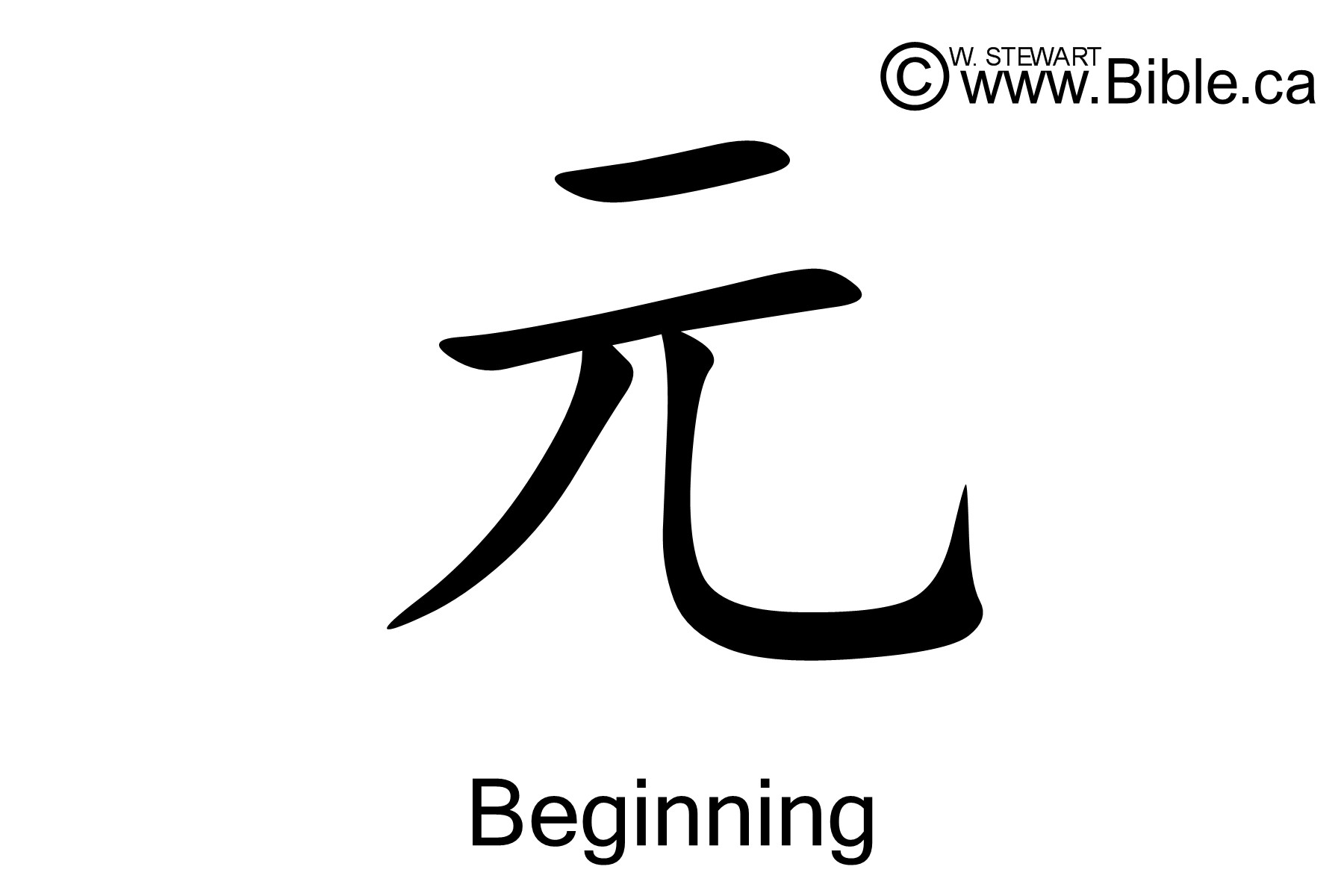 Here, with God's commandment about the tree of the knowledge of good and evil being violated, a new BEGINNING has come. The Chinese syntax reveals the BEGINNING of sin through the word shi. The etymology of this word reveals that the WOMAN SECRETLY took the fruit into her MOUTH. After she ate, she then gave it to Adam, and he ate of it also.
Here, with God's commandment about the tree of the knowledge of good and evil being violated, a new BEGINNING has come. The Chinese syntax reveals the BEGINNING of sin through the word shi. The etymology of this word reveals that the WOMAN SECRETLY took the fruit into her MOUTH. After she ate, she then gave it to Adam, and he ate of it also.
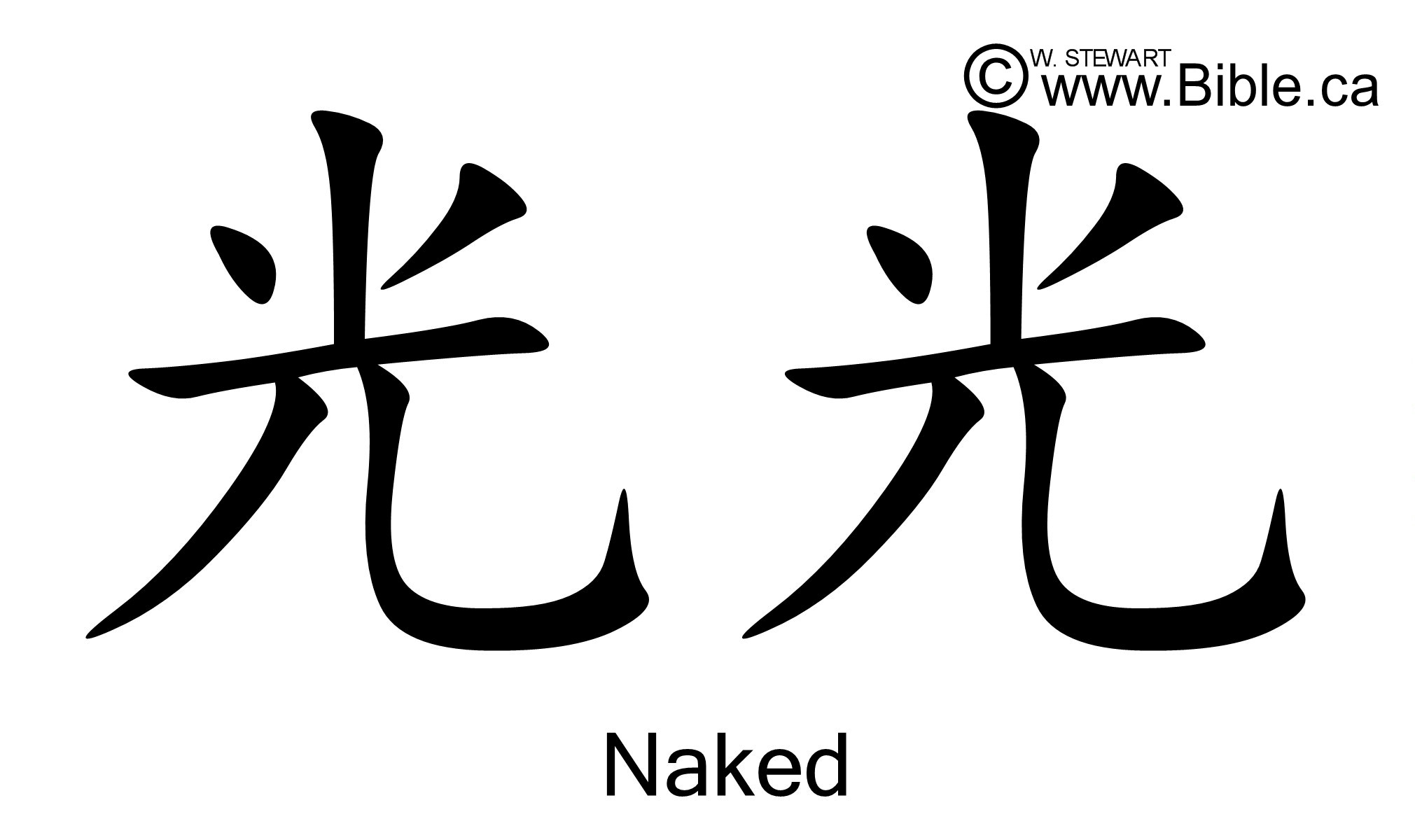
Naked
Genesis 2:25 describes Adam and Eve as being naked, but unashamed. They were perfect, sinless beings. There was no reason for, not even a concept of shame. Their unashamed nakedness is pictured in the word guang guang, which pictures two radiant LIGHTS side by side (discussed more in the Creation Account article). However, after eating from the tree of the knowledge of good and evil, Adam and Eve knew they were naked. Moses wrote:
Then the eyes of both of them were opened, and they knew that they were naked; and they sewed fig leaves together and made themselves coverings. (Genesis 3:7, NKJV)

Luo is another Chinese word for NAKED, but is very different from guang guang. Rather than displaying man's innocence, it is a reminder of their sin. Luo can be written three different ways, but the right side of the character always remains the same. If you look carefully, you will see the image on the right is a combination of characters we've looked at above, GARDEN and TREE. Their knowledge about their nakedness had to do with the garden tree. But, beyond this, when garden and tree are written together as they appear in luo, they mean FRUIT! They knew they were naked because they had eat of the fruit from the garden tree of which God commanded them not to eat!

The characters appearing on the left side of luo are MAN, BODY, and CLOTHING respectively. It is the third of these we want to pay particular attention to. The word clothing has an unmistakable reference to Adam and Eve, for by it's etymology, it literally pictures TWO PEOPLE being COVERED. As we saw above in GARDEN (yuán), the second person is coming from the side of the first. The only two people such an image fits is Adam and Eve, for a rib had been taken from Adam's side, and from it, God formed Eve. As the text above indicates, Adam and Eve felt the need to cover themselves, and so they made coverings for themselves from the fig leaves.

Hide
As the Genesis narrative continues after Adam and Eve had eaten the fruit of the tree of the knowledge of good and evil, we read:
...they heard the sound of the LORD God walking in the garden in the cool of the day, and Adam and his wife hid themselves from the presence of the LORD God among the trees of the garden. (Genesis 3:8, NKJV)

Their reaction to the Lord approaching them is captured in the Chinese word for HIDE (duo). The three components of the word literally state BODY SEVERAL TREES. That is exactly what they did. They did their best to blend their bodies among the trees. God called to them, and a conversation began. We should expect that God called them to COME (lái) out from among the trees as He spoke to them. In lái, we see TWO PEOPLE who are behind a TREE. What logical reason is there for the word come to show two people behind a tree? But if we look at it in light of the details we have in Genesis, it makes perfect sense.
Pain & Sorrow
In the next several verses of the Genesis account, the consequences of sin are given. To the woman, God said,
I will greatly multiply your sorrow and your conception, in pain you shall bring forth children; your desire shall be for your husband, and he shall rule over you. (Genesis 3:16, NKJV)

As a result of the woman's sin, she would experience PAIN (chu) in childbearing. As we look at the components of the character, we see a reminder of the TWO TREES which were in the midst of the garden; one which they were forbidden to eat from, but did in disobedience (the tree of the knowledge of good and evil); the other which they could freely eat from, but would not be permitted to any longer (the tree of life). In the lower portion of the character, the woman's place of submission to her husband is addressed, for the two images there literally mean UNDER MAN. Note, this was not given as part of her punishment, but as a reminder of the place which the Lord had given her when He created her, that she might be "...a helper comparable to..." man.
To the man, God said,
..because you have heeded the voice of your wife, and have eaten from the tree of which I commanded you, saying, 'You shall not eat of it,' cursed is the ground for your sake; in toil you shall eat of it all the days of your life. Both thorns and thistles it shall bring forth for you, and you shall eat the herb of the field. (Genesis 3:17-18, NKJV)

Adam's SORROW would come from his work among the thorns and thistles. The Chinese word ku reveals these thorns and thistles as ANCIENT WEEDS. Further to this, the image may actually picture Adam feeding himself from among these weeds, as the character for ancient can break down further to show TEN (perhaps fingers) and his MOUTH.

Thorns
There are two images in the Chinese language which tell us about this ancient curse pronounced against Adam. Jing (THORNS) is literally the WEEDS PUNISHMENT. If we take another step in our etymological analysis, we see that the word for punishment has three characters in it - a KNIFE, which is an instrument of punishment, and TWO OFFENDERS. We might expect to find one offender in the word punishment, but why did the ancient Chinese writers include a second person? Both Adam and Eve were responsible for the coming of the weed punishment, and both would feel the effects of it.

A second image for THORNS is jí. Jí shows these same TWO OFFENDERS, each COVERING over a TREE. This may represent Adam and Eve coming to the tree of the knowledge of good and evil, though they were commanded not to, or perhaps it shows that now, the tree of life would be covered to them, out of their access. Whichever it is, it does seem clear that jí is picturing Adam and Eve, who made themselves offenders before God by eating from the tree which He said not to eat from.
Sweat
The Lord continued to speak to Adam,
In the sweat of your face you shall eat bread till you return to the ground, for out of it you were taken; for dust you are, and to dust you shall return. (Genesis 3:19, NKJV)

Chu hàn is a Chinese word for SWEAT. Certainly, there are a number of reasons why one might sweat: a hot day, sitting in a sauna, going for a run, playing a sport, etc.. This image does not picture any of these. The etymology of chu hàn shows an OFFENDER who has been SENT OUT with WATER (perspiration) pouring off him. That is exactly who Adam was! (Genesis 3:23)

In fact, Moses recorded about Adam that God "..sent him out of the garden of Eden ... He drove out the man.." (Genesis 3:23-24, NKJV). The Chinese word gan, EXPEL or DRIVE OUT in the English, speaks of the DAY on which the OFFENDER was TO GO. Further, it is noteworthy that the word zou (GO) breaks down further, showing us TWO PEOPLE of DUST. As we have seen in other images, the second person is coming from the side of the first.
Death & Grave
Recall when God warned Adam about the tree of the knowledge of good and evil, He said,
..in the day that you eat of it you shall surely die. (Genesis 2:17, NKJV)

Sadly, Eve heeded the voice of the serpent, who lied, saying, "You will not surely die" (Genesis 3:4, NKJV). The result is that death came into the world (Romans 5:12). There are several images in the Chinese language which can be used for DIE, but of particular interest is zú. This word pictures TWO PEOPLE who have had their PERFECTION COVERED. Adam and Eve, once perfect in the sight of God, were now covered with guilt, sin and death.

In the first part of this article, we noted the GLORY (róng) which Adam and Eve had. They were radiant people, having access to the tree of life. Now, because of sin, their association with the tree was gone - now, they were bound for the GRAVE (yíng). This word features the same TWO RADIANT PEOPLE (in the image of a FLAME), COVERING over DUST. They would die - they would return to the dust from which they came.
Beginning
Before expelling the man and his wife from the garden of Eden, God showed His great mercy upon them. We read,
And for Adam and his wife the LORD God made tunics of skin, and clothed them. (Genesis 3:21, NKJV)
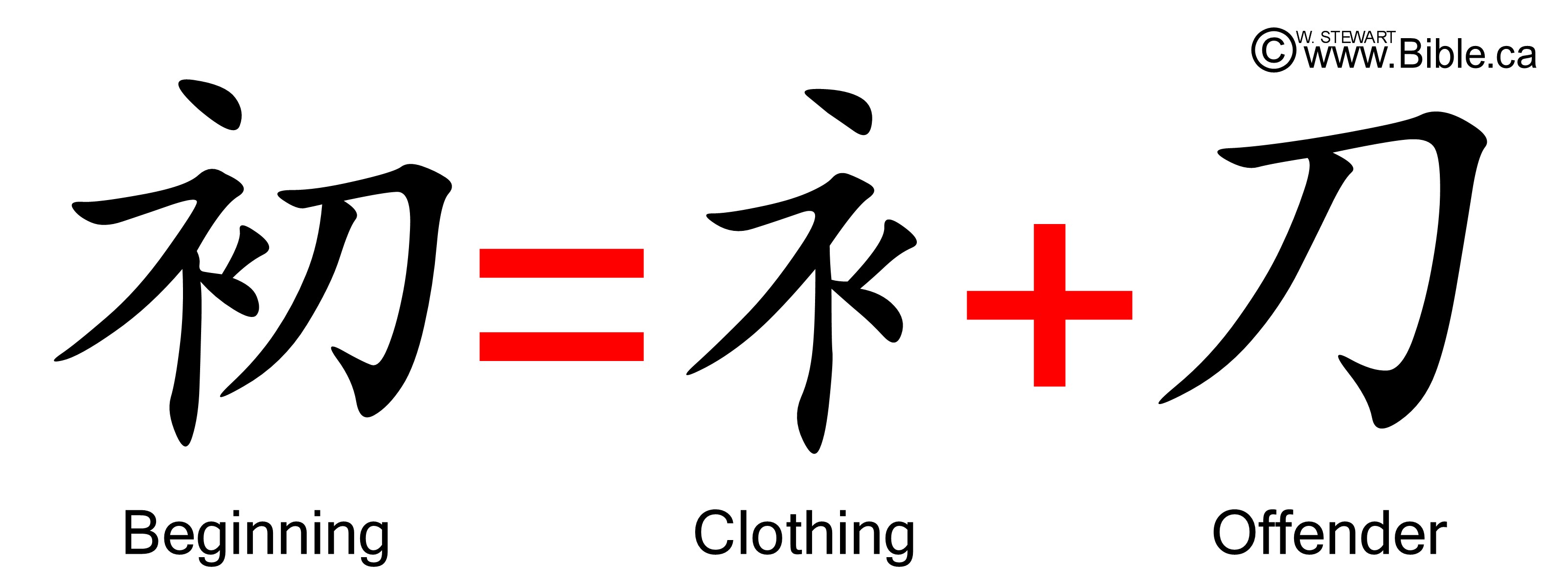
It is often affirmed from this text that Adam and Eve failed to adequately clothe themselves (Genesis 3:7), so the Lord covered them in a modest fashion. While that may be true, there is a greater purpose in these tunics of skin. God made sacrifice for the man and his wife - a pair of animals died for them. The Chinese language pictures this as a BEGINNING (chu). This is the beginning of atonement. In it, we see the characters to represent their CLOTHING made of animals skins, supplied by means of a KNIFE. Previously, we noted that the image for clothing shows two people being covered, the second person coming from the side of the first. Here, they are covered with skins from a pair of animals which had been put to death for them.

This is now the third word we have seen for BEGINNING in the Chinese language, and all three are distinct as we look at their etymology. The BEGINNING of creation was recorded in the word yuán. The BEGINNING of sin was recorded in the word shi. And now, the BEGINNING of atonement is recorded in the word chu. All three words mean beginning, but their etymologies demonstrate how different they are!

Distant & Alone
We began this article with a pair of images for GARDEN. One of them, yuán, pictured the garden enclosure with two people, one coming from the side of the other, who were made of dust and had the breath of life. All of the details which were inside the enclosure is also found in the image for FAR or DISTANT. Chuò tells us of the same two people, but instead of being in the garden, now they are WALKING. Genesis 3:24 tells us that God drove the man out of the garden of Eden.

A Chinese word for ALONE describes how Adam and Eve felt, having been evicted from the garden of Eden. Dan is a unique word for alone - it has TWO PEOPLE in it. But, these two people are on the outside of the PERFECT GARDEN.
 Guarded
Guarded
With the man and woman put out of the garden, lest they try to return, God set a guard for the way to the tree of life. Moses tells us that God
..drove out the man; and He placed cherubim at the east of the garden of Eden, and a flaming sword which turned every way, to guard the way to the tree of life. (Genesis 3:24, NKJV)
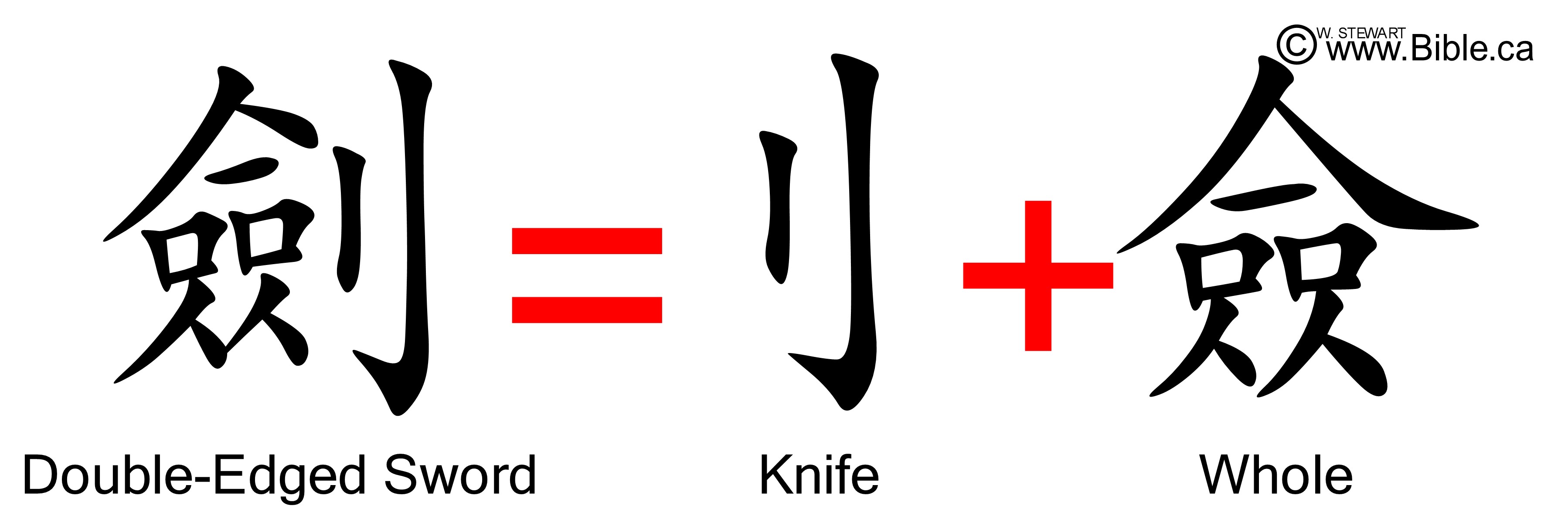
The ancient Chinese recorded this protection of the entrance to Eden with the word bao, meaning GUARD. It shows us a MAN, the ENTRANCE to the garden, and the TREE of life. Even the sword is found in the record of the Chinese, identified as a DOUBLE-EDGED SWORD (jiàn). The sword was a KNIFE in the hand of the cherubim standing between the WHOLE world and the tree of life. This word WHOLE is discussed in the creation article, and reveals TWO PEOPLE TOGETHER as the whole population in the beginning - Adam and Eve.
by William J. Stewart
| The Creation Account | << Previous | Next >> | Cain and Abel |
